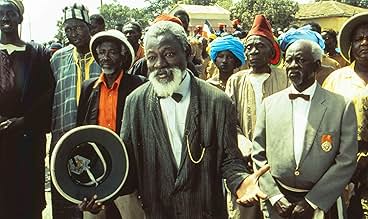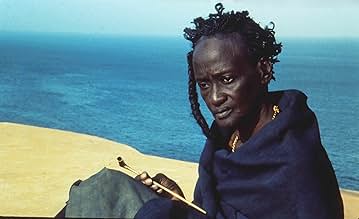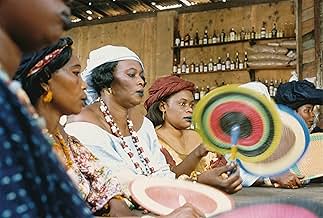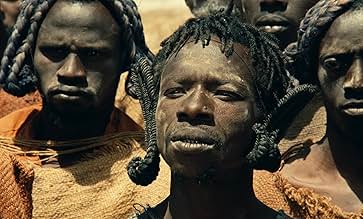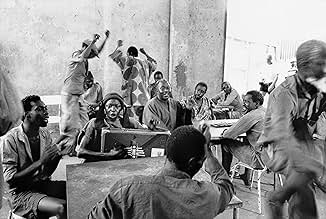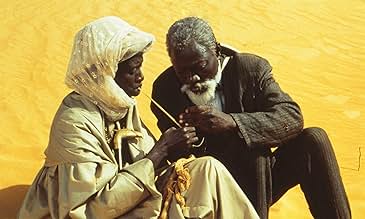Hyènes
- 1992
- Tous publics
- 1h 50m
IMDb RATING
7.4/10
1.5K
YOUR RATING
Dramaan is the most popular man in Colobane, but when a woman from his past, now exorbitantly wealthy, returns to the town, things begin to change.Dramaan is the most popular man in Colobane, but when a woman from his past, now exorbitantly wealthy, returns to the town, things begin to change.Dramaan is the most popular man in Colobane, but when a woman from his past, now exorbitantly wealthy, returns to the town, things begin to change.
- Director
- Writers
- Stars
- Awards
- 1 win & 1 nomination total
Omar Ba
- Le chef du protocole
- (as Omar Ba dit 'Baye Peul')
Issa Samb
- Le Professeur
- (as Issa Ramagelissa Samb)
Rama Thiaw
- La femme du Maire
- (as Rama Tiaw)
Abdoulaye Diop
- Le Médecin
- (as Abdoulaye Yama Diop)
Oumi Samb
- La danseuse
- (as Oumy Samb)
Tcheley Hanny
- Amazone
- (as Hanny Tchelley)
- Director
- Writers
- All cast & crew
- Production, box office & more at IMDbPro
Featured reviews
A once-prosperous Senegalese village has been falling further into poverty year by year until the village's elders are reduced to selling town possessions to pay debts. Linguère, a former resident and local beauty, now very rich, returns to this, the village of her birth. The elders hope that she will be a benefactor to the village. To encourage her generosity, they appoint a local grocer, Dramaan, as mayor -- who once courted her and will now try to persuade her to help.
This is an adaptation of Friedrich Dürrenmatt's Swiss-German satirical play "The Visit", which I am not familiar with, so I will have to judge the film on its own merits. Knowing nothing of Senegal, I love how they really used the village and surroundings and made it a crucial part of the film. The story is strong and funny in its own way, but I think the locale is a bigger selling point. I've never been anywhere in Africa, and certainly not Senegal... this made a strong visual impression on me.
This is an adaptation of Friedrich Dürrenmatt's Swiss-German satirical play "The Visit", which I am not familiar with, so I will have to judge the film on its own merits. Knowing nothing of Senegal, I love how they really used the village and surroundings and made it a crucial part of the film. The story is strong and funny in its own way, but I think the locale is a bigger selling point. I've never been anywhere in Africa, and certainly not Senegal... this made a strong visual impression on me.
Hyenes, Mambety's avent-guard, surrealistic film captures the real heart and soul of the human social and economical blood thirst for money, when stopping to think about the different animal symbols in this film like the hyena, vulture, and yes even the monkey; you can't help feeling ashamed to be part of the big machine, we call progress. than again is that not what human nature, or the nature of animals is all about? Survival of the fittest. Mambety not only nails the human viciousness and easily influenced character on the head, but he slaps you in the face with our greed. A real plus to this movie is the musical language of Wolof. a must see movie and language, which cannot be matched.
Hyenes is a foreign film from Senegal adapted from a play, The Visit, by Swiss playwright Friedrich Dirrenmatt. It is spoken in the local language with English subtitles.
This film is surreal. It makes political statements and explains how a poor, failing village becomes prosperous by the greed of it's residents and the revenge of one of it's former community members.
Linguere Ramatou, played by Ami Diakhate, was once a young women who left her home village under less than honorable terms and has now become wealthy. She returns to her village to bestow a large sum of money so that the poor village can become a prosperous city. However, she seeks revenge upon her once seducer Dramaan, played by Mansour Diouf.
Dramaan had abandoned Ramatou when they were young forcing her to go to the city to engage in "the oldest profession." Now, Dramaan is an elder grocer granting good on credit to the unemployed villagers whom come to his store much to the displeasure of his wife and co-store keeper.
The villagers, learning that Ramatou is returning after many years to bestow money upon the village, appoints Dramaan the local mayor and instructs him to once again "woo" Ramatou so that she will make a large contribution to the village of Colobane.
What happens next is a surreal tale of how Dramaan fawns over his once love and her reactions to this lover from long ago.
The simple actions of Dramaan are often funny as well as the actions of the village's local officials. Ramatou is willing to provide the large endowment to the village on one condition. You need to see the movie to know that condition and how a "soul" is traded for the donation.
The village customs are interesting for Westerners whom may have little or no knowledge of some African customs. It is a little difficult to follow the fast movie English subtitles while listening to the dialogue in Senegalese. The film may need to be viewed more than once for the Westerner to fully comprehend the story and motivations of the principal players.
This film is surreal. It makes political statements and explains how a poor, failing village becomes prosperous by the greed of it's residents and the revenge of one of it's former community members.
Linguere Ramatou, played by Ami Diakhate, was once a young women who left her home village under less than honorable terms and has now become wealthy. She returns to her village to bestow a large sum of money so that the poor village can become a prosperous city. However, she seeks revenge upon her once seducer Dramaan, played by Mansour Diouf.
Dramaan had abandoned Ramatou when they were young forcing her to go to the city to engage in "the oldest profession." Now, Dramaan is an elder grocer granting good on credit to the unemployed villagers whom come to his store much to the displeasure of his wife and co-store keeper.
The villagers, learning that Ramatou is returning after many years to bestow money upon the village, appoints Dramaan the local mayor and instructs him to once again "woo" Ramatou so that she will make a large contribution to the village of Colobane.
What happens next is a surreal tale of how Dramaan fawns over his once love and her reactions to this lover from long ago.
The simple actions of Dramaan are often funny as well as the actions of the village's local officials. Ramatou is willing to provide the large endowment to the village on one condition. You need to see the movie to know that condition and how a "soul" is traded for the donation.
The village customs are interesting for Westerners whom may have little or no knowledge of some African customs. It is a little difficult to follow the fast movie English subtitles while listening to the dialogue in Senegalese. The film may need to be viewed more than once for the Westerner to fully comprehend the story and motivations of the principal players.
Dürrenmatt's play The Visit is one of the best stories ever told about guilt and honesty. Would it be ruined by being transferred to a village in Africa by a visionary director whose main quality is to create images? That's what I asked myself before watching Hyenas.
And I was surprised in the most positive way. Diop Mambéty hardly changed the plot but supplied it with wonderful images which can only be found in Africa. So why didn't he change the story? Because he didn't have to. The story of the old lady taking revenge on her home village in the most cruel way fits perfectly into the context Mambéty placed it. It seems as though the story had never been imagined to take place in Switzerland; Senegal absorbs it completely.
The choice of Ami Diakhate is maybe the most perfect ever made by any film or stage director, as regards the role of Dürrenmatt's old lady. She has the mark of death and bitterness on her, the condescension of the rich and the hatred of those who have been humiliated. The other actors are charming, also well-cast, though sometimes I felt they would have needed a little more directoral guidance. However, my untrained European eye was not expected too much of: in some Asian, Afroamerican or African movies (shame on me) it is very hard for me to tell the various characters apart, which was not the case in Hyenas.
A wonderful story, a wonderful film. A pity that I will probably never see it again.
And I was surprised in the most positive way. Diop Mambéty hardly changed the plot but supplied it with wonderful images which can only be found in Africa. So why didn't he change the story? Because he didn't have to. The story of the old lady taking revenge on her home village in the most cruel way fits perfectly into the context Mambéty placed it. It seems as though the story had never been imagined to take place in Switzerland; Senegal absorbs it completely.
The choice of Ami Diakhate is maybe the most perfect ever made by any film or stage director, as regards the role of Dürrenmatt's old lady. She has the mark of death and bitterness on her, the condescension of the rich and the hatred of those who have been humiliated. The other actors are charming, also well-cast, though sometimes I felt they would have needed a little more directoral guidance. However, my untrained European eye was not expected too much of: in some Asian, Afroamerican or African movies (shame on me) it is very hard for me to tell the various characters apart, which was not the case in Hyenas.
A wonderful story, a wonderful film. A pity that I will probably never see it again.
After the twenty-year period of silence following the success of 'Touki Bouki', Mambéty's second film gives its satire a more analytical frame. The quasi-allegorical narrative structure explores the relation of past to present within a specifically-though exaggerated-political frame; its events are specifically set in a collective context, where the continuing legacy of imperialism as it effects relations gendered, sexual and economic relations in the (post)colony. Returning to her village as a fabulously wealthy citizen, for whom wealth is also index of damage, literal prosthesis-the arm made of gold!- Linguère Ramatou is something like 'Touki Bouki's' Anta some decades on, returned to take revenge on Dramaan Drameh, the man who abandoned her and has since taken up a role as a comfortable, well-liked bar owner-and a kind of de facto, unofficial mayor-within the still impoverished town. The devil's bargain-that her wealth will be that of the village if they execute him-is not only index of personal revenge, a kind of just deserts for the past sins of patriarch-Drameh paid false witnesses to testify that he was not the father of her child, leading her to be driven out of town and to a career as a sex worker-but of the inhuman and dehumanising bargains of global capital, the mendacious ways in which continuing underdevelopment and the power relations of the centre-periphery relation structure the life it's possible to live. Ramatou simply serves as the agent of the ways in which collectives are divided-whether by the structures of gendered power relations or by the 'hyena-like' rapaciousness the promise of money brings. Such economic structures rely on the mythic realities that any dream can be bought, and that its fulfilment will invariably come at the expense of others. Through a satirical broad-brush, Mambéty seeks to make such bargains specific, rather than the abstract underlay of virtually every human interaction; it makes a vivid and convincing case whose laughs have the sting of accuracy.
Did you know
- TriviaRestored over the course of 2017 by Eclair Digital in Vanves, France. The restoration was taken on by Thelma Film AG.
- ConnectionsFeatured in The Story of Film: An Odyssey: Movies to Change the World (2011)
- How long is Hyenas?Powered by Alexa
Details
- Release date
- Countries of origin
- Official sites
- Languages
- Also known as
- Hyenas
- Filming locations
- Production companies
- See more company credits at IMDbPro
Box office
- Gross US & Canada
- $24,672
- Gross worldwide
- $24,672
Contribute to this page
Suggest an edit or add missing content


